Kenneth Atchity's Blog, page 11
December 16, 2024
Story Merchant E-Book Deal: Rainbows for Hana: Mourning Our Cat Brought Us a Miracle by Kenneth Atchity
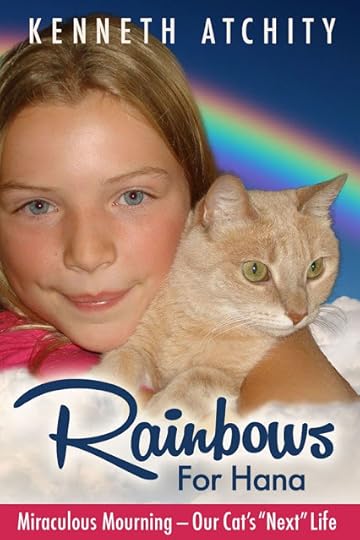
AVAILABLE ON AMAZON
When our beloved tabby flew out the window to her death, our devastation was transformed by a mysterious series of events that seemed to us like miracles.
As we landed in Los Angeles after a trip to Rome, two events occurred nearly simultaneously: my granddaughter Meggie spotted a unique and most glorious rainbow, and my wife Kayoko received a call on her cell phone from a man who found Hana on the ground, unmoving. From that moment of agony Hana reached out from across the rainbow to displace the grief in our hearts with joy. It’s a story that anyone who’s ever loved a pet will not forget.
December 11, 2024
New From Story Merchant Books Crook's Paradise by David Mandy
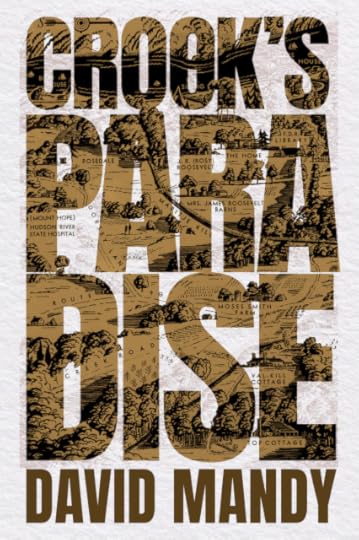
AVAILABLE ON AMAZON This story unfolds along Crum Elbow, the most storied bend in the Hudson River. This magical spot has attracted a long line of historical figures and crooks, beginning with Charles Crook.
Now, with its mighty mansions in decay, sinister forces are cutting the town off from history and the natural order. None of this is lost on Valentine Hitch. The last of the patrician landowners and visionary-Life photographer has a plan to reclaim Crum Elbow. After Jessica, a Sotheby’s art expert, shows up to inspect one of Valentine’s rare Sargent paintings and his prodigal nephew returns from California, things begin to happen.
When a repentant billionaire, a shadowy eco-terrorist, and a millennial river hydrologist get involved, Valentine comes face to face with the shadowy, new breed of crooks.
December 9, 2024
Story Merchant E-Book Deal FREE December 9 - December 13! Eric Burns' When The Dead Talked... and the Smartest Minds in the World Listened
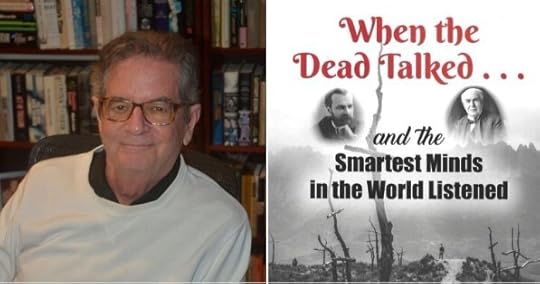
AVAILABLE ON AMAZON
In the late 19th century, an estimated 11 million Americans believed in something called Spiritualism. They believed in it so ardently that it came to be thought of as a religion, and it became the seventh most popular religion in the United States. Its fundamental tenet—virtually its only tenet—was that it was possible for the living to communicate with the dead.
America’s philosopher King William James believed in it. Thomas Edison believed. Mark Twain believed. Countless number of scholars and scientists—although always a minority—also believed. Or, at the least, they believed that the belief should be tested, not scoffed at; that it might deserve to be part of university curricula, not the raw material of derisive humor.
The same was true across the Atlantic, where Spiritualism attracted Marie Curie, Queen Victoria, two British Prime Ministers, Pope Pius IX and Russia’s Czar Alexander II, among numerous others. Hundreds of the smartest minds in the world—geniuses all—formed societies in New York and London to investigate the notion of conversation with the deceased.
They conducted scores of experiments under the most rigid, secure and sometimes even punishing of conditions, and some of what they discovered startled them. As When the Dead Talked . . . and the Smartest Minds in the World Listened, attests, it is still startling today.
"Readers fascinated by how scientists in the last half of the 19th century thought about psychic phenomena will appreciate Burns's exploration of this fascinating history."- Publishers Weekly
"Eric Burns has a gift for exploring the nooks and crannies and shadows of history that seldom get illuminated. When the Dead Talked . . . and the Smartest Minds in the World Listened [is] a vastly informative and entertaining book that can't help but leave a reader wondering where reality leaves off the magic begins."
- Neal Gabler, author of Winchell: Gossip, Power and the Culture of Celebrity (Time magazine best non-fiction book of the year)
December 7, 2024
CONGRATULATIONS TO LEO DAUGHTRY AUTHOR OF TALMADGE FARM
Talmadge Farm Has made the GOETHE SHORT LIST
of Late Historical Fiction Award!

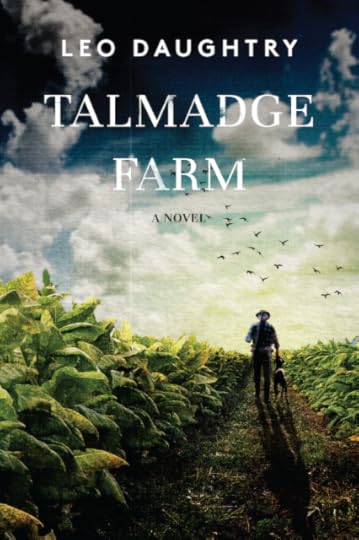
AVAILABLE ON AMAZON
"Talmadge Farm has often been described as a love letter to the South. Daughtry says, “Despite what the South has done and is doing, everybody loves the South. The South has a charm about it, and this book talks about the good parts of the South, how good the people are, and what the South has meant to so many of us… It’s a love story in many respects.”
It’s 1957, and tobacco is king. Wealthy landowner Gordon Talmadge enjoys the lavish lifestyle he inherited but doesn’t like getting his hands dirty; he leaves that to the two sharecroppers – one white, one Black – who farm his tobacco but have bigger dreams for their own children. While Gordon takes no interest in the lives of his tenant farmers, a brutal attack between his son and the sharecropper children sets off a chain of events that leaves no one unscathed. Over the span of a decade, Gordon struggles to hold on to his family’s legacy as the old order makes way for a New South.
Read Talmadge Farm: https://www.amazon.com/Talmadge-Farm-Leo.../dp/B0D3WW6BHL/.
December 5, 2024
GC Brown: From Prison Walls to the Top 5 – An Unforgettable Story
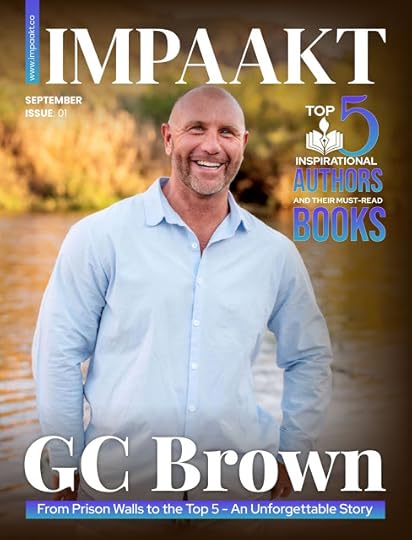
Forget the typical author bio. GC Brown’s life is a page-turner in itself. This bestselling author wasn’t always crafting captivating narratives. In fact, his journey began in a place most wouldn’t associate with creativity – federal prison.
Bored to the bone and yearning for escape, GC stumbled upon writing as a way to break the monotony. Little did he know, his forced foray into storytelling would unlock a hidden talent and a new lease on life.
GC’s writing is as bold and unconventional as his past. He draws on his unique experiences, weaving characters with “pizazz” and stories that resonate with raw authenticity. His upcoming thriller, “Sniff,” promises to be a gripping exploration of the criminal underworld, led by a morally ambiguous protagonist you can’t help but root for.
GC Brown is more than just an author – he’s an epitome to the power of second chances. His story is a reminder that even the most unexpected journeys can lead to incredible destinations.
Ready to dive into GC’s world and discover what makes him a Top 5 Inspirational Author? Turn the page and let the adventure begin!
GC Brown, can you tell us a little about your journey as an author? What drew you to writing?I wouldn’t say drawn to writing; more like forced. I was in federal prison looking down a road I couldn’t see the end of. Overnight, I went from living what I thought was ‘the life’ to a cage. I went from thousand-dollar loafers to the guy standing next to me wearing the same commissary tennis shoes. My life became a monotony of soul-crushing boredom with no flavor. Day after day of the same fluorescent lights, the same shitty meals, the same shitty staff, the same shitty smell of defeat.
The prison was shitty and boring.
I was so done with it.
I walked into my case manager’s office, his feet up on the desk, piles of unopened files everywhere, and the same smell of defeat, and asked what I could do to make all the shittyness go away.
With mocking disdain, he said, “Write a book.”
Brilliant! Because that’s exactly what I did in my former life of wheelin’ and dealin’.
I walked out of his office, and right into an illegal poker game being hidden from the CO’s—correctional officers—in the back of the showers. I played poker for a few months. Short story: I won; two gang members tried to stiff me; I caught them by themselves the next day.
We all ended up in the Special Housing Unit—the hole.
If you thought General Population was mind-numbing…
I ended up doing 15 months in the box. During those months I was in the middle of my appeals. There were legal calls with my attorney. On one of those calls, he asked me what I did all day in the hole. “Read. All I do is read.”
He said, “You should write a book.”
Yeah, because I hadn’t heard that one before.
Low and behold, the USA Today newspaper makes it to my cell. Front page: Top 10 Hardest Things to Do. Near the top of the list, you guessed it: ‘writing a novel.’
They say things come in 3’s.
The universe—God, to me—was telling me to pick up a pen.
Today, here I am with you—a bestselling author, or well, at least that’s the plan.
Looking at your bibliography, your books consistently garner praise for their captivating storytelling and relatable characters. How do you achieve this level of reader connection in your writing?Well, first and foremost it pleases me to no end to hear readers think my books are cool. There is no greater compliment to an author. Well, except maybe if you’re lucky enough to have met the woman of your dreams from federal prison through email, only to have her fall in love with you over your written words, and then agree to marry you…sight unseen.
Yeah, I’ve checked off a few lists.
Anyway, I’ve said this before: on this planet, there may not be a better place than a federal prison from which to learn to write. It’s like a never-ending parade of Drug lords with pizazz, corner boys with gusto, gangsters with bad grammar, pimps without the cane, billionaires still rubbin’ your nose in it, politicians with no comment, and LGBTQ minus the “L’s.”
Characters in spades.
I wrote who I saw; who I lived with. Most of the time, it was a high school soap opera sprinkled with violence. Like, who couldn’t write there? I found relatable characters and put them into memorable scenes.
I found characters who readers could rally behind.
What, in your experience, are the key ingredients for crafting a “must-read” book that resonates with a broad audience?This is one of those questions I could answer and make myself sound smart. Answers like, “The key ingredients you need are ‘authentic voice, vivid locales, universal themes, and emotional resonance, blah, blah, blah.” Name them off just like that.
I’m not that smart though.
Let’s face it, I’m new to this whole writing world…that picked me.
I’d never thought about writing anything, especially something that required ‘ingredients’.
When I picked up that pen, immediately it felt like a big deal. A big deal, like there could be money involved. Back then, that’s the way my mind worked. What’s the payday? Not the deal, the payday.
I quickly ran the numbers.
They made sense.
So, I wrote my first book, solely from ego. At that point in my life, it was my key ingredient, along with sarcastic and witty. And it just so happens I was living amongst all kinds of other egos as big as mine. Their lives and stories and daily grinds became my new life.
I was staring at the rest of the key ingredients.
I turned them into my first book, The Wake of the Storm.
The book would go on to win first place for The Benjamin Franklin Award.
That’s a whole ‘nother story.
Beyond the plot, do you weave any personal experiences or lessons learned into your stories? If so, how does that shape the narrative?Let me start off answering this question giving you a glimpse into the old me. I began my adult working career at 7 years old. This is what it’s like growing up on a small farm in the middle of Nowhere, Indiana. It’s up before dawn and to bed after dark. There are chickens that need their necks rung, giant piles of number 2 that need shoveling, fields that need plowing, and gardens to be tended.
Fast forward to my twenties: I bought and sold mobile homes (because who doesn’t love a good trailer?); which led to flipping houses (before it was in vogue); developing real estate (for the sake of humanity); running nightclubs (where the real magic happens); coding software (because who needs experience?); selling flowers online (the ultimate hustle); serving sushi (raw fish and entrepreneurship go hand-in-hand); and, the pièce de résistance—the African diamond trade (because nothing screams “legit business” like blood diamonds).
So, the answer in short is yes, there are plenty of personal experiences weaved in and out of my stories. And don’t even get me started on lessons learned. I received a 20-year sentence “up the road” for some of my imbecile moves. My experiences and lessons are all over the narrative.
Many authors talk about their writing routines. Do you have any specific rituals or habits that help you get into a creative flow?For me, it’s all about routine.
In prison, there is zero quiet time between 6 am and 10 pm. I mean zero. It’s 200-300 hundred men per unit. There’s yelling and screaming. There are prison-made speakers. Dudes are rapping, singing, and slamming dominoes. There’s a spades game, a group of gang members doing burpees in the corner, and the cops are always looking for someone. It’s chaos. Because of it, I got in the habit of writing after lights out. I developed a routine. I quickly read through what I had written the day before, jumped in a hot shower, and concentrated on the scene until I could see it. When I had a clear picture in my head, I toweled off, threw on shorts, a t-shirt, and curled up in my rack.
A dull pencil and typing paper most of the time.
Depending on the creative flow, I either continued the scene or started a new one.
Even today, with all the fancy stuff to write with, I lay on my chaise and scribble out half a dozen pages or so, until I feel like I’ve created a flow, where my reader forgets he’s reading a book.
Your upcoming book, “Sniff,” seems intriguing. Can you share a brief glimpse into the central theme or concept without giving away any spoilers?Of course. I love talking about my book(s). SNIFF is a riveting crime thriller that plunges readers into the gritty underworld of high-stakes, international intrigue, and relentless pursuit. The protagonist, Bank Robbin’ Dave, is a former high-flying financier turned desperate criminal. Dave is a complex character whose moral ambiguity and raw determination make him both compelling and relatable.
Starts with a gripping prologue set in South Florida and carefully runs the reader through chapters of various international locales. The plot twists and turns through a maze, revealing more and more of Dave’s tumultuous life and the web of corruption and desperation he navigates.
The narrative is rip-roaring and paced masterfully to keep you on your toes. It’s unapologetically bold, blending dark humor with stark realism. The dialogue is sharp, the action sequences are vivid.
“SNIFF” stands out not just for its thrilling plot but also for its deep dive into the psyche of a man on the edge. It’s a tale of survival, betrayal, and the lengths one will go to for love and redemption.
The title, “Sniff,” is quite evocative. Can you elaborate on the inspiration behind the name and how it reflects the core of the book?I could tell you a fib right here: that the title, SNIFF, came from some magical place in my head; or that I laid in my prison rack, locked down during COVID, trying to come up with some uber-cool, short, snappy name that would look as cool as it does, on a cover, and then in Hollywood; or that I wanted a title that evoked some sensory connection.
However, I didn’t come up with the title.
One of these many different characters I ran across in the BOP, said it first.
I remember immediately thinking, “Man that’s a cool name for a book.”
And here we are.
I do have to be honest here though, “I actually did picture it right then in Hollywood in the Hollywood lights.”
Psst…My Publisher and PR company have been in Hollywood for 50+ years. I’m halfway there. Now all I need is to sell enough books to get to the top of Best Seller lists.
As a writer, you have the power to transport readers to different worlds. If you could magically enter the world of any book (besides your own!), which one would you choose and why?Hands down, it would be anything Wilbur Smith ever wrote. He helped me through my time in prison. There are these adventures all over Africa, at all different Eras of time. It’s villages and natives, lions and elephants. It’s riding on horseback, living in tents, sailing oceans, and love stories.
I would fall into Wilbur Smiths’ pages and not come back until the cops yelled, “Chow!”
As a successful author with a dedicated following, what advice would you give aspiring writers who are just starting out?Well, it’s a bit premature to measure my success. Let’s get to the end of this thing, in another 30, 40 years, then look back. I’ll let others make the call.
I do know that it’s going to take a lot to get there. All the grit and tenacity I can find. And that’s exactly what I will tell everyone, aspiring to be anything. “It’s that old farmers’ creedo: “First one up, last one to go to sleep and work like there’s no tomorrow.”
One day you’ll look back and your mind will be blown.
I’m living it right now.
Looking ahead, what are your writing goals or aspirations for the future? Are there any specific themes or genres you’d like to explore in your next book?Well, I have so many writing goals that I will probably take a few of them with me. I spent years mapping my life out, staring at the bunk above me. Believe me, I have a plan and I’m already executing it. I have goals in place all the way to the end. I started writing late in my career and there is a lifetime of milestones that I have to go back and get.
As for themes and genres for tomorrow’s books, all I can tell you is that I refuse to be ordinary. My writing is all over the board right now. I want to write anything and everything. I’m not going to pigeonhole myself to any one genre. I’m going to give my readers different themes, different plots, and different places.
Every book.
I don’t know what I’m going to write tomorrow until I read what I wrote yesterday, right before I jump in the shower.

December 2, 2024
Leo Daughtry, Political Leader, Author On Carolina Writers Speak
LISTEN HERE

AVAILABLE ON AMAZON
"Talmadge Farm has often been described as a love letter to the South. Daughtry says, “Despite what the South has done and is doing, everybody loves the South. The South has a charm about it, and this book talks about the good parts of the South, how good the people are, and what the South has meant to so many of us… It’s a love story in many respects.”
It’s 1957, and tobacco is king. Wealthy landowner Gordon Talmadge enjoys the lavish lifestyle he inherited but doesn’t like getting his hands dirty; he leaves that to the two sharecroppers – one white, one Black – who farm his tobacco but have bigger dreams for their own children. While Gordon takes no interest in the lives of his tenant farmers, a brutal attack between his son and the sharecropper children sets off a chain of events that leaves no one unscathed. Over the span of a decade, Gordon struggles to hold on to his family’s legacy as the old order makes way for a New South.
November 28, 2024
HAPPY THANKSGIVING
November 27, 2024
NEW From Story Merchant Books SNIFF by G.C. Brown
An action-adventure story about antihero David Liecht, who worked his way to the top of the commercial real estate world, only to lose everything while finding love…and then teeter on the brink of losing that too.

TALKIN’ BILLIONAIRES INTO OR OUT OF SHIT IS WHAT I DO.
Some would say I’m slick with the lingo.
Other people will tell you other things.
I’ve been a wheeler and dealer my entire life. I’ve had some monster wins, and I’ve taken some big hits. You’re going to read about the worst of it.
Of course, there’s a woman involved.
Not your thing? Don’t worry, there are a plethora of other players in the story too.
Let’s see, there’s a hooker and a general. One looks killer, and one is a killer.
There are Muslim drug lords, now in real estate. A Venezuelan hillbilly who was out playin’ in the dirt and struck oil.
And you’re going to meet an African prince with diamonds to spare.
Let me think…There’s a fat redneck from the sticks of Florida and his buddy, an MS13 gang banger who wants to be a rapper. More millionaires, a couple of billionaires. And oh, I can’t leave out the Count. A Frenchy, who fancies himself a mobster…in the Med.
Spoiler alert: He gets whacked.
The “good guys” do eventually show up. Most of ’em in those stupid blue windbreakers, three dumbass letters across the back in case the crewcuts and aviators didn’t make it clear enough.
Wait ’til I tell you about the kidnappers and the Russian Shylock I call “Yak-off.”
These stories are going to spin you on your head, but that’s it for the teaser.
I’ll see you on the inside.
—Bank Robbin’ Dave
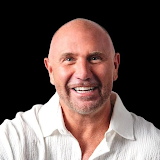 ABOUT G.C. Brown
ABOUT G.C. BrownFrom a farm insmall-town Indiana to the diamond fields of Africa to federal prison back inthe States and everywhere in between, GC Brown has surfed some big waves in theocean of life's adventures. Now, he's balancing babies, books, and businessfrom his home in California, where he lives with his wife, two sons, andtheir brand-spanking-new identical twin boys. SNIFF: Book 1 in the SNIFF,SMOKE, SHOOT Series is his debut novel.
November 19, 2024
Q & A with Deborah Kalb and Author Leo Daughtry

Q: What inspired you to write Talmadge Farm, and how did you create your cast of characters?
A: The Baby Boomer generation brought about a great transition in our country. I’m a little older than the Baby Boomers so I remember what life was like in the ‘40s and ‘50s, when segregation was rampant in the South and television and rock-n-roll didn’t exist yet.
I grew up on a tobacco farm, and the kids of the sharecroppers on the farm were some of my best friends. But it wasn’t a life they wanted, and sharecropping as a whole began to die out as young people began to look for a life off the farm. I thought this period of time from 1957 to 1967 was one that deserved some conversation and attention.
The cast of characters were based on my own experience growing up on a tobacco farm in Sampson County, North Carolina.
Q: The Kirkus Review of the novel says, in part, “At the heart of the novel is a thoughtful meditation on the inexorability of change, and what happens when justice results in a redistribution of success.” What do you think of that description?
A: I think it’s a good characterization of the story. The ‘50s and ‘60s were a tumultuous time, with major changes taking place in both the farming industry and the banking industry.
It was also a time when the balance of power began to shift as new opportunities became available for women and people of color.
In the novel, Jake, a Black teenager, runs away to Philadelphia and eventually goes to medical school. His sister goes to secretarial school and gets a job at the clerk of court. These opportunities did not exist for young Black people just a few years prior.
So we have some characters who embrace and benefit from changing times and some – like Gordon Talmadge – who are unable and unwilling to adapt.
Q: Did you know how the novel would end before you started writing it, or did you make many changes along the way?
A: I had a rough outline of the novel before I started. Certain plot points – the smokehouse attack, Jake going to Philadelphia, Will’s encounter with the sheriff, Gordon losing the bank and Gordon’s lung cancer diagnosis – were predetermined. The rest of the story came together in the writing process.
Q: What do you hope readers take away from the story?
A: I hope they like the characters, and I hope they gain an understanding of some of the changes that happened during this time period, such as the demise of sharecropping and how the Research Triangle Park became a reality and made a significant difference to North Carolina and to our country.
Q: What are you working on now?
A: We’re gearing up for the release of the novel! It’s been a labor of love for several years now, and I’m really excited about connecting with readers and learning their thoughts about the characters and the events that take place in the novel.
Q: Anything else we should know?
A: I’ve always been a big reader throughout my whole life. I enjoy talking to friends about books and we often make recommendations to one another about books we like.
I enjoy a variety of genres. I’ve read a number of Doris Kearns Goodwin’s presidential biographies. For a while, I was into books about World War I. Then I moved onto David Baldacci mysteries. I love how books can both transport us to new worlds and provide deep insight into subjects we may be unfamiliar with.
via Interview with Deborah Kalb
Deborah Kalb is a freelance writer and editor. She spent about two decades working as a journalist in Washington, D.C., for news organizations including Gannett News Service, Congressional Quarterly, U.S. News & World Report, and The Hill, mostly covering Congress and politics. Her book blog, Book Q&As with Deborah Kalb, which she started in 2012, features hundreds of interviews she has conducted with a wide variety of authors.
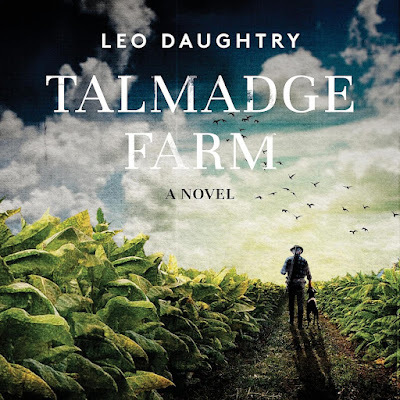
AVAILABLE ON AMAZON
"Talmadge Farm has often been described as a love letter to the South. Daughtry says, “Despite what the South has done and is doing, everybody loves the South. The South has a charm about it, and this book talks about the good parts of the South, how good the people are, and what the South has meant to so many of us… It’s a love story in many respects.”
It’s 1957, and tobacco is king. Wealthy landowner Gordon Talmadge enjoys the lavish lifestyle he inherited but doesn’t like getting his hands dirty; he leaves that to the two sharecroppers – one white, one Black – who farm his tobacco but have bigger dreams for their own children. While Gordon takes no interest in the lives of his tenant farmers, a brutal attack between his son and the sharecropper children sets off a chain of events that leaves no one unscathed. Over the span of a decade, Gordon struggles to hold on to his family’s legacy as the old order makes way for a New South.
November 18, 2024
Story Merchant E-Book GIVEAWAY Ken Atchity's Sell Your Story to Hollywood
 Available on Amazon
#FREE November 18 - November 22!
Available on Amazon
#FREE November 18 - November 22!The #1 Writer's Pocket Guide to the Business of Show Business by Kenneth Atchity.Through the expanding influence of the Internet and the corporatization of both publishing and entertainment, the process of getting your book to the big screen has gotten more complicated, more eccentric, and more exciting.This little book aims to help you figure out how to get your story told on big screens or small. Maren R, Reviewer
Full of information but still easy to read! If you want to start screen writing -even if it snot the rather lofty goal of becoming a Hollywood writer- this book will tell you how you could actually manage it!
Cristie U, Reviewer
This is a helpful and honest guide as to how to get your book made into a movie or tv show. It seems like it would be easier now because of the internet, but the author points out how difficult it still is and how to ensure your book gets into the right hands.
Terri D, Reviewer
Sell Your Story to Hollywood is a quick guide to getting your story into the hands of those who make things happen in Hollywood. The author Kenneth Atchity speaks from experience with decades working in Hollywood to get stories from the page to the screen. Although every guide about breaking into Hollywood should be viewed through the lens of how small the odds really are, this book starts out a bit discouraging for those who are truly interested in learning what they can do to move from a novel to a produced screenplay. The first step in getting this done, according to this book? Have an international bestseller. Okay. Not everyone can do that. Step 2: get reviewed by the NYT or other prestigious publication. Um... if a writer had that, they probably wouldn't need this book. While some of these initial steps are not quite what you would consider actionable advice for getting your screenplay produced, the book does move toward more actionable steps that you can take, though the guide does assume that you have a great story to tell with either an impeccably written novel or screenplay. As a writer with scripts but no connections to the industry, the parts of this book that I found most helpful were actual Appendix B and Appendix C. Writers at any stage can probably find something useful to take away from this guide to use in pursuing their own Hollywood career.
Reviewer 428382
Informative and well written, this is a guide that ever writer should read. I really enjoyed it and learned a lot.
pamula f, Reviewer
Hollywood buys stories all of the time. Sometimes they buy a story that started out as a small article in a hometown newspaper. This book will show you how to get your writing out there for the world to see.
Steven M, Reviewer
I’ve recently completed a screen writing course and was delighted to have been approved for this ARC. The author clearly knows his stuff and offers an insight into the world of scriptwriting for movies. A perfect introduction to a world that some of us can only dream of.
Librarian 121315
Have you ever watched a movie and thought to yourself that you can come up with a better story? Or have you ever been inspired by a movie to tell a story of you own? For either of those cases, this is one of the books that you must read. I said one of the books because there are other books that can also stir you in the right direction; nevertheless, this book will certainly give you a good start. I loved that the author offers real life examples of movies that we have heard or watched before making the book’s contents more relatable to the readers. This is a great introduction to the business of movie making and readers should feel more comfortable with this subject after studying this book.




